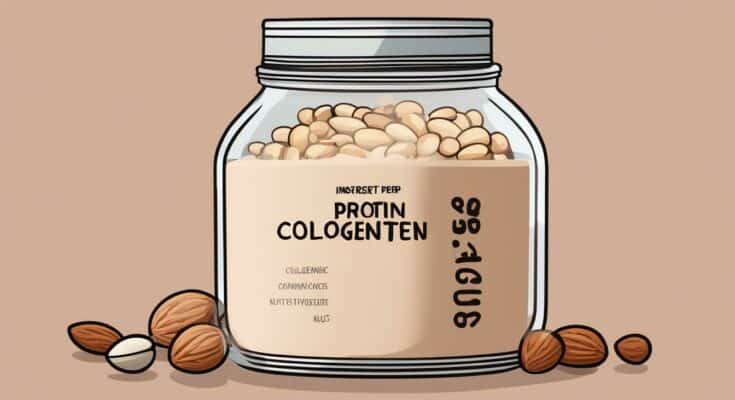Protein is a crucial nutrient that is necessary for maintaining a healthy body and supporting various bodily functions. Collagen, a protein that makes up a significant portion of the skin, bones, and connective tissues, is gaining popularity for its potential health benefits. But how much protein is in collagen, exactly?
In this section, we will delve into the protein content of collagen and provide you with detailed information on how much protein it contains. Understanding the protein content in collagen is essential for those looking to boost their overall health and well-being.
Key Takeaways:
- Collagen is a protein that makes up a significant portion of the skin, bones, and connective tissues.
- Understanding the protein content in collagen is crucial for assessing its nutritional value.
- In the following sections, we will explore the protein content of collagen, its benefits, and how to incorporate it into your diet.
What is Collagen and its Role in the Body?
Collagen is a protein that makes up a significant portion of our body’s connective tissue, including our skin, tendons, ligaments, and bones. It provides structure and support, helping our tissues and organs maintain their shape and strength.
Collagen also plays a crucial role in skin health, as it helps maintain elasticity and hydration. As we age, our collagen production naturally decreases, which can contribute to wrinkles and sagging skin.
Additionally, collagen is important for joint health, as it helps cushion and protect our joints during movement. It also supports muscle growth and repair.
Overall, collagen is a vital protein in our body, with a range of functions that contribute to our overall health and well-being.
The Protein Content in Collagen: Everything You Need to Know
Collagen is a unique protein source that contains a wide range of amino acids, making it ideal for supporting various functions and tissues within the body. But how much protein is in collagen, and what is the protein content of collagen?
Collagen is primarily made up of three amino acids: glycine, proline, and hydroxyproline. These amino acids form a unique triple helix structure, which gives collagen its strength and stability. In terms of its protein content, collagen is made up of around 30% protein, making it an excellent source of dietary protein.
| Type of Collagen | Protein Content |
|---|---|
| Type I | 90% |
| Type II | 10% |
| Type III | 70% |
As you can see, the protein content of collagen varies depending on the type. Type I collagen, which is the most abundant type in the body, contains the highest protein content, at around 90%. Type II and Type III collagen have lower protein contents, at around 10% and 70%, respectively.
Collagen protein also contains a unique combination of amino acids that are not commonly found in other protein sources. These include hydroxyproline and proline, which play an important role in collagen’s structure and function. Additionally, collagen protein is high in glycine, which has anti-inflammatory and antioxidant properties, and supports healthy digestion.
So, what does this collagen protein analysis mean for your diet? Adding collagen protein to your meals and snacks can help increase your overall protein intake and provide a range of health benefits. Whether you’re looking to support your joints, improve your skin health, or simply boost your protein intake, collagen can help you achieve your goals.
Collagen vs. Other Protein Sources: How Does it Compare?
When it comes to protein, collagen is often compared to other popular protein sources. Let’s take a closer look at how it measures up in terms of protein quantity and quality.
| Protein Source | Protein Quantity per Serving | Protein Quality |
|---|---|---|
| Whey Protein | 20-25 grams | High-quality protein with all essential amino acids |
| Soy Protein | 15-20 grams | Vegans can consume it; may contain phytoestrogens that affect hormones |
| Plant-Based Proteins | 10-15 grams | Protein quality can vary depending on the source |
| Collagen Protein | 10-20 grams | Contains all non-essential amino acids, but lacks some essential amino acids |
As we can see, collagen protein offers a moderate amount of protein per serving, typically containing between 10-20 grams. However, it’s important to note that collagen lacks some essential amino acids, which makes it an incomplete protein source. On the other hand, whey protein offers a high-quality protein with all essential amino acids, making it a popular choice among athletes and fitness enthusiasts.
Despite its limitations, collagen protein has numerous benefits that make it worth incorporating into your diet. It offers unique amino acids, such as glycine and proline, that are not found in other protein sources and that have been linked to improved skin health and joint function.
Additionally, collagen is easy to digest and can be used in a variety of recipes, such as smoothies, soups, and baked goods, making it a convenient and versatile source of protein.
Collagen vs. Other Protein Sources: Which is Right for You?
The choice between collagen and other protein sources ultimately depends on your individual nutritional needs and goals. If you’re looking to improve your athletic performance or build lean muscle, whey protein may be the better option due to its protein quality and high quantity per serving. However, if you’re looking to support your skin and joint health, collagen protein may be the better choice due to its unique amino acids. More information คอลลาเจนผิวขาวที่เห็นผลจริง
Ultimately, incorporating a variety of protein sources into your diet, including collagen, can help ensure you’re getting all the essential amino acids your body needs for optimal health and well-being.
Benefits of Consuming Adequate Protein from Collagen
Collagen protein is not only essential for our skin, hair, nails, and bones, but also for our overall health and well-being. Below are some essential collagen nutritional facts and benefits that make it an excellent addition to your diet:
- Promotes Skin Health: Collagen makes up a significant portion of our skin, contributing to its elasticity and hydration. Consuming collagen protein can help improve skin moisture and elasticity, reducing the appearance of fine lines and wrinkles.
- Supports Joint Function: Collagen is a vital component of our joints, tendons, and ligaments. Consuming collagen protein can help reduce joint pain and inflammation, supporting overall joint health and mobility.
- Aids Digestion: Collagen protein can help improve digestive health by supporting the lining of the intestines, reducing inflammation, and aiding in the breakdown of food.
- Boosts Muscle Mass: Collagen contains specific amino acids that are essential for muscle growth and development. Consuming collagen protein can help improve muscle mass, strength, and endurance.
- Reduces Inflammation: Collagen protein contains high levels of glycine and other amino acids with anti-inflammatory properties. Consuming collagen protein can help reduce inflammation throughout the body, improving overall health and reducing chronic disease risk.
By incorporating collagen protein into your diet, you can experience these and other benefits that support optimal health. With its impressive nutritional value, collagen protein is an excellent option for those looking to boost their protein intake while improving their overall health and well-being.
How to Incorporate Collagen Protein into Your Diet
Now that we’ve explored the protein content and benefits of collagen, let’s discuss how to incorporate it into your daily diet. Here are some practical tips:
Add it to your morning coffee or tea: Collagen peptides dissolve easily in hot liquids and are tasteless, making them the perfect addition to your morning cup of coffee or tea. Simply add a scoop to your beverage and stir until dissolved.
Mix it into smoothies or shakes: Collagen protein is a great addition to smoothies or shakes, giving them an extra nutritional boost. Simply blend a scoop of collagen protein powder with your favorite fruits, vegetables, and other ingredients for a delicious and healthy drink.
Use it in cooking: Collagen protein can also be used in cooking and baking, adding a protein boost to your favorite recipes. Simply mix collagen protein powder into your favorite soups, stews, and sauces, or use it as a substitute for flour in baking recipes.
Take it in supplement form: If you’re looking for a quick and easy way to add collagen protein to your diet, consider taking it in supplement form. Collagen supplements come in a variety of forms, including capsules, tablets, and powders.
No matter how you choose to incorporate collagen protein into your diet, be sure to pay attention to the recommended serving sizes and adjust your intake accordingly. With consistent use, you’ll start to see the benefits of this powerful protein source.
Potential Side Effects and Considerations
While collagen protein provides many benefits, it’s essential to be aware of any potential side effects or considerations before incorporating collagen into your diet.
Firstly, some individuals may experience an allergic reaction to collagen protein. If you have a history of food allergies or experience any symptoms such as hives, difficulty breathing, or swelling, seek medical attention immediately.
Additionally, collagen supplements may interact with certain medications, such as blood thinners and antibiotics. It’s crucial to consult your healthcare provider before taking collagen if you’re currently taking any medications.
Lastly, it’s important to note that collagen supplements are not regulated by the FDA, meaning their safety and efficacy are not guaranteed. Ensure you purchase collagen from a reputable source and follow the recommended dosage instructions.
Despite these considerations, collagen protein still holds significant value and benefits for those looking to improve their overall health and well-being. Understanding the potential risks and precautions is crucial for making informed decisions and incorporating collagen into your diet safely and effectively.
Overall, collagen’s protein power offers many advantages, making it a valuable addition to any diet.
Boost Your Health with Collagen’s Protein Power
In conclusion, collagen protein is a valuable addition to any diet, offering numerous benefits for our overall health and well-being. With its impressive protein content, collagen can help you achieve your daily protein intake goals while also promoting skin health, supporting joint function, and improving overall health.
If you’re looking to incorporate collagen protein into your diet, there are numerous options available. Collagen supplements are a popular choice, available in various forms such as powders, capsules, and gummies. You can also find collagen in various food products such as bone broth, protein bars, and protein powders.
When adding collagen to your diet, it’s important to be aware of the potential side effects and considerations. If you have any concerns or medical conditions, consult with your healthcare provider before incorporating collagen protein into your diet.
Start Your Collagen Journey Today
Don’t miss out on the benefits of collagen protein. Start incorporating it into your diet today and experience the positive impact it can have on your health. Whether you’re looking to boost your protein intake, improve your skin health, or support your joint function, collagen protein can help you achieve your goals.
FAQ
Q: How much protein is found in collagen?
A: Collagen typically contains around 90% protein by weight.
Q: What are the nutritional facts of collagen protein?
A: Collagen protein is rich in amino acids, including glycine, proline, and hydroxyproline.
Q: What is the role of collagen in the body?
A: Collagen plays a vital role in maintaining the health and function of various bodily tissues, including skin, bones, joints, and tendons.
Q: How does the protein content in collagen compare to other protein sources?
A: Collagen protein quantities may vary depending on the source, but it is generally comparable to other animal-based protein sources such as whey protein.
Q: What are the benefits of consuming adequate protein from collagen?
A: Consuming adequate protein from collagen can promote skin health, support joint function, and contribute to overall well-being.
Q: How can I incorporate collagen protein into my diet?
A: You can easily incorporate collagen protein into your diet by adding collagen supplements or consuming collagen-rich foods such as bone broth or collagen peptides.
Q: Are there any potential side effects or considerations when consuming collagen protein?
A: While collagen protein is generally safe for consumption, it’s important to be aware of any potential allergies or sensitivities. Consulting with a healthcare professional is recommended.




